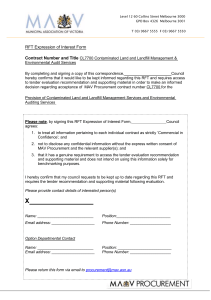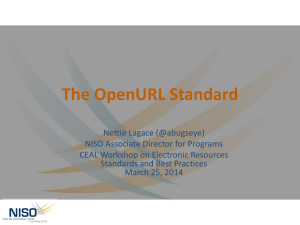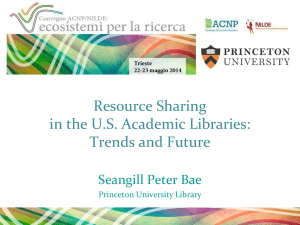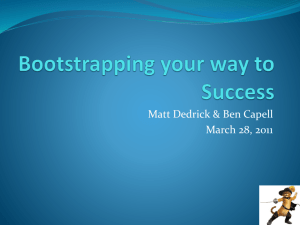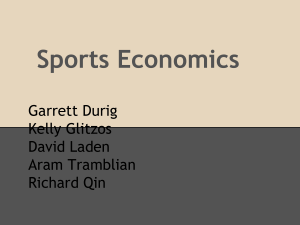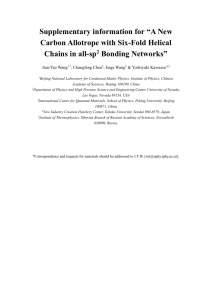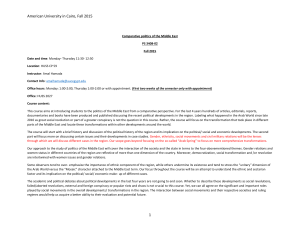Dealing with the Ethics behind Industrial Waste
advertisement
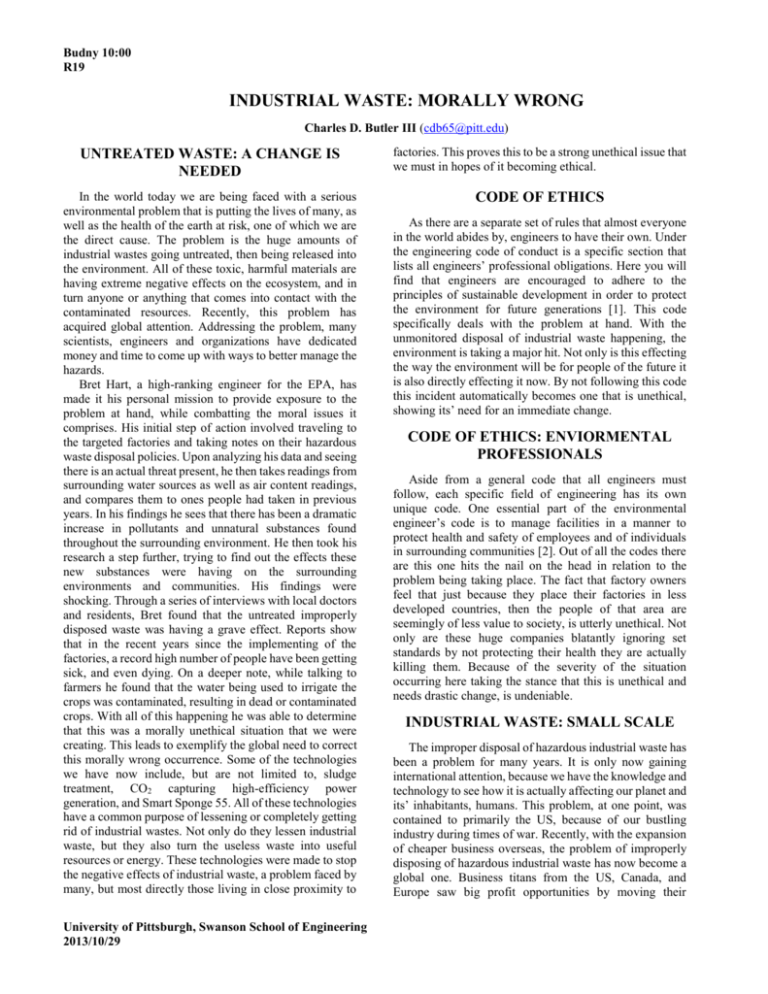
Budny 10:00 R19 INDUSTRIAL WASTE: MORALLY WRONG Charles D. Butler III (cdb65@pitt.edu) UNTREATED WASTE: A CHANGE IS NEEDED factories. This proves this to be a strong unethical issue that we must in hopes of it becoming ethical. In the world today we are being faced with a serious environmental problem that is putting the lives of many, as well as the health of the earth at risk, one of which we are the direct cause. The problem is the huge amounts of industrial wastes going untreated, then being released into the environment. All of these toxic, harmful materials are having extreme negative effects on the ecosystem, and in turn anyone or anything that comes into contact with the contaminated resources. Recently, this problem has acquired global attention. Addressing the problem, many scientists, engineers and organizations have dedicated money and time to come up with ways to better manage the hazards. Bret Hart, a high-ranking engineer for the EPA, has made it his personal mission to provide exposure to the problem at hand, while combatting the moral issues it comprises. His initial step of action involved traveling to the targeted factories and taking notes on their hazardous waste disposal policies. Upon analyzing his data and seeing there is an actual threat present, he then takes readings from surrounding water sources as well as air content readings, and compares them to ones people had taken in previous years. In his findings he sees that there has been a dramatic increase in pollutants and unnatural substances found throughout the surrounding environment. He then took his research a step further, trying to find out the effects these new substances were having on the surrounding environments and communities. His findings were shocking. Through a series of interviews with local doctors and residents, Bret found that the untreated improperly disposed waste was having a grave effect. Reports show that in the recent years since the implementing of the factories, a record high number of people have been getting sick, and even dying. On a deeper note, while talking to farmers he found that the water being used to irrigate the crops was contaminated, resulting in dead or contaminated crops. With all of this happening he was able to determine that this was a morally unethical situation that we were creating. This leads to exemplify the global need to correct this morally wrong occurrence. Some of the technologies we have now include, but are not limited to, sludge treatment, CO2 capturing high-efficiency power generation, and Smart Sponge 55. All of these technologies have a common purpose of lessening or completely getting rid of industrial wastes. Not only do they lessen industrial waste, but they also turn the useless waste into useful resources or energy. These technologies were made to stop the negative effects of industrial waste, a problem faced by many, but most directly those living in close proximity to CODE OF ETHICS University of Pittsburgh, Swanson School of Engineering 2013/10/29 As there are a separate set of rules that almost everyone in the world abides by, engineers to have their own. Under the engineering code of conduct is a specific section that lists all engineers’ professional obligations. Here you will find that engineers are encouraged to adhere to the principles of sustainable development in order to protect the environment for future generations [1]. This code specifically deals with the problem at hand. With the unmonitored disposal of industrial waste happening, the environment is taking a major hit. Not only is this effecting the way the environment will be for people of the future it is also directly effecting it now. By not following this code this incident automatically becomes one that is unethical, showing its’ need for an immediate change. CODE OF ETHICS: ENVIORMENTAL PROFESSIONALS Aside from a general code that all engineers must follow, each specific field of engineering has its own unique code. One essential part of the environmental engineer’s code is to manage facilities in a manner to protect health and safety of employees and of individuals in surrounding communities [2]. Out of all the codes there are this one hits the nail on the head in relation to the problem being taking place. The fact that factory owners feel that just because they place their factories in less developed countries, then the people of that area are seemingly of less value to society, is utterly unethical. Not only are these huge companies blatantly ignoring set standards by not protecting their health they are actually killing them. Because of the severity of the situation occurring here taking the stance that this is unethical and needs drastic change, is undeniable. INDUSTRIAL WASTE: SMALL SCALE The improper disposal of hazardous industrial waste has been a problem for many years. It is only now gaining international attention, because we have the knowledge and technology to see how it is actually affecting our planet and its’ inhabitants, humans. This problem, at one point, was contained to primarily the US, because of our bustling industry during times of war. Recently, with the expansion of cheaper business overseas, the problem of improperly disposing of hazardous industrial waste has now become a global one. Business titans from the US, Canada, and Europe saw big profit opportunities by moving their Charles D. Butler III production practices to large, urban third-world cities in Asia. This move contained pros and cons. The companies that decided to make this move profited a lot, but the reason they were able to profit is where the problem lies. In Asia and other places, companies cut building costs, paid extremely low wages, and most often paid little to nothing in proper waste disposal. Due to the improper care of the industrial waste, the first to suffer were those in surrounding villages. One community in particular, Greater Noida, India, that made claims of chemical and other industries dumping untreated waste, leading to polluted water, in turn causing several life-threatening diseases [3]. Certain villages were affected more than others. The increased number of illness’ and deaths drew attention from environmentalists and doctors alike. A law student from one of the affected villages, Arun Baisoya, tells that “in the past five years 29 people have died of cancer, [and he] suspects that the highly polluted water is the main reason” [3]. This demonstrates how the immediate negative effects of the industries was felt amongst the native people. Reports even tell that the exporting of hazardous wastes to lesser developed nations is escalating beyond control, and that these ethical implications and environmental consequences highlight the need for international controls by more developed countries [4]. This displays how out of control the situation has gotten and why it must be changed. an estimated 125 million people in low to middle-income countries, which is on the scale of malaria or tuberculosis [6]. The effects of untreated industrial wastes is obviously detrimental to humanity, but that is not all it affects. INDUSTRIAL WASTE AND THE ENVIRONMENT Left untreated industrial waste can and will affect the environment, along with the people. One commonality of the environment being effected is its’ ties to the water, into which most waste, aside from air-borne waste, is dumped. When untreated waste enters the water it negatively interacts with all marine life. One oceanography expert reports, “[that] the Pakistani mangrove forest is shrinking, due to sea pollution” [7]. This may seem insignificant to most until learning that globally mangrove forests are directly responsible for the economic benefits of more than 21 trillion dollars [7]. Another major way sea pollution effects the environment is its direct relationship with global warming. Due to the rise in sea level temperatures, caused by pollution, the global temperature rises with it [7]. Showing another explicit example of how the effects of this improper practice are clearly breaking ethical codes. Because the problems occurring in the environment have become so complex, such as climate and biodiversity loss, waste management is more relevant than ever before [8]. Even though there has been much damage done there are now mass efforts to try and lessen or rid the effects of untreated industrial waste. INDUTRIAL WASTE: GLOBAL SCALE As this is happening on small scale, something much worse is happening on a larger scale in Pakistan. In Pakistan there is a city called Sialkot. Sialkot is Pakistan’s industrial capital. There are over 1000 products being produced here daily. With this heavy production comes 52 million liters of wastewater per day, most of which just runs into the river, because shockingly, “[these] industrial units have no wastewater treatment facilities” [5]. This massive amount of untreated hazardous waste mixing with the main source of bathing, drinking and cleaning water causes problems for many people who use this water for their daily lives. A well-known environmental scientist tells that, “Waterborne diseases have increased about 200 percent in the last two decades” [5]. This is just the tip of the iceberg. With seemingly an epidemic happening The NCS (National Conservation Strategy) started taking report understand what was happening, the results were shocking. Reports indicated that about 40 percent of deaths were related to water-borne diseases, 25-30 percent of all hospital admissions were connected to water-borne bacteria, and 60 percent of infant deaths were associated with the same infections [5]. All of this data is a clear sign that this is something that shouldn’t be taken lightly. If not treated properly this type of thing can happen to anyone around the world, making it an issue everyone should care about. Contrarily, one article reports that wastes from industrial dumps and other toxic sites affect the health of FOUNDATION FOR CHANGE As the world started to acknowledge that there was a grave unethical problem occurring, many countries then decided it was time put a stop to these ways and finally change. One way in which countries started the change movement was by creating organizations whose sole purpose was to regulate factories waste management. A specific example is the AIIP (Arab International Industrial Projects Company) that welcomed Kabd, Kuwait’s largest factory. AIIP was established with the “desire to preserve the environment, [and] apply international solutions and innovations to recycle environmental waste, especially industrial waste” [9]. Also, directly battling the unethical practices that were taking place, came the creation of Ethisphere World’s Most Ethical Companies (WME) list. This list rewards companies who are a part of it along with having a winner, being named the Most Ethical Company in the world. This helped battle issues by forcing companies to look at their policies. It now includes 100 countries and 36 industries [10]. BATTLING INDUSTRIAL WASTE Aside from trying to change the way factories are run to reduce waste, specific tools have been developed to 2 Charles D. Butler III [1] (2013). “NSPE Code of Ethics for Engineers.” National Society of Professional Engineers. (Online Article). http://www.nspe.org/Ethics/CodeofEthics/index.html directly fight the waste as it is produced, and not requiring the factory to change any of its’ regular routines. The first of these, is a proposed CO2 capturing power generation system. I found this one most productive and the best idea, because it would be able to capture 100 percent of all CO2 emitted, thus generating no thermal nitrogen [11]. In essence this machine would eliminate almost all of the carbon-dioxide that comes from a factory, thus protecting the ozone and the environment. Additionally this machine has the ability to take something that was once a waste product (CO2) and turn it into energy, giving the carbondioxide driven generator a 59.3% fuel-to-electricity efficiency, compared to the 10.9% of a regular steam turbine [11]. The next tool made is designed to be a low cost way to battle untreated water waste. The product is called “Smart Sponge 55.” The Smart Sponge is a 55 gallon drum filter system that is fully self-contained, so no human contact is needed [12]. A drum-filter system is a large container with a several part filter inside, taking most impurities out of the water. This product is extremely cost efficient, so a company would have no excuse not to use it. With multiple companies using it the amount of bacteria, including e-coli (deadly bacteria), left in the water would be significantly reduced. The last uses the emerging technology of thermal hydrolysis advanced digestion [13]. Like the CO2 product, this is one that can take something that was waste and make it useful. Using this new technology 500,000 tons of sludge can be reduced to 60,000 tons, and the sludge used will go through the digestion process in which the end product is methane gas, which can be used to fuel gas engines [13]. With these advances and changes in the way hazardous industrial waste is handled, a once huge unethical problem is now being slowly stopped. [2] (2009-2012). “Environmental Professionals NREP Code of Ethics.” National Registry of Environmental Professionals. (Online Article). https://www.nrep.org/ethics.php [3] (09/17/2012). “Industrial waste making groundwater toxic.” Hindustan Times. (Online Article). http://rt4rf9qn2y.search.serialssolutions.com/?ctx_ver=Z3 9.88-2004&ctx_enc=info%3Aofi%2Fenc%3AUTF8&rfr_id=info:sid/summon.serialssolutions.com&rft_val_ fmt=info:ofi/fmt:kev:mtx:journal&rft.genre=article&rft.at itle=Industrial+waste+making+groundwater+toxic&rft.jtit le=The+Hindustan+Times&rft.date=2012-0917&rft.pub=HT+Media+Ltd&rft.externalDocID=276249 4711&paramdict=en-US [4] J. Singh, V.C. Lakhan. (11/1989). “Business Ethics and the International Trade in Hazardous Wastes.” Journal of Business Ethics. (Online Article). http://www.jstor.org/stable/25071981 [5] S. Mahmud. (08/12/2011). “Sialkot industrial, urban waste: groundwater pollution causing serious health Issues.” Business Recorder. (Online Article). http://go.galegroup.com/ps/i.do?action=interpret&id=GA LE%7CA264155538&v=2.1&u=upitt_main&it=r&p=IT OF&sw=w&authCount=1 [6] S. Leahy. (10/24/2012). “Pollution as big a health problem as malaria or TB, finds report.” Global Development. (Online Article). http://www.theguardian.com/globaldevelopment/2012/oct/24/pollution-health-problemmalaria-tb [7] (11/16/2012). “Untreated industrial waste poisoning sea.” Pakistan Press International. (Online Article). http://rt4rf9qn2y.search.serialssolutions.com/?ctx_ver=Z3 9.88-2004&ctx_enc=info%3Aofi%2Fenc%3AUTF8&rfr_id=info:sid/summon.serialssolutions.com&rft_val_ fmt=info:ofi/fmt:kev:mtx:journal&rft.genre=article&rft.at itle=Untreated+industrial+waste+poisoning+sea&rft.jtitle =Pakistan+Press+International&rft.date=2012-1116&rft.pub=AsiaNet+Pakistan+%28Pvt%29+Ltd&rft.ext ernalDocID=2817713511&paramdict=en-US [8] R. Krishnamoorthy. (6/21/2010). “The need of the hour is environmental management.” The Hindu. (Online Article). http://go.galegroup.com/ps/i.do?id=GALE%7CA2299377 68&v=2.1&u=upitt_main&it=r&p=AONE&sw=w [9] N. Fattahova. (11/20/2011). “Factory sets precedence in waste management.” Business Insights: Global. (Online Article). http://rt4rf9qn2y.search.serialssolutions.com/?ctx_ver=Z3 9.88-2004&ctx_enc=info%3Aofi%2Fenc%3AUTF8&rfr_id=info:sid/summon.serialssolutions.com&rft_val_ fmt=info:ofi/fmt:kev:mtx:journal&rft.genre=article&rft.at ON THE RIGHT PATH As they say in many 7-step programs, the hardest part in changing yourself is usually admitting you have a problem. It is clear that our world is no longer living in denial of the errors we were inflicting on the earth and the ethic codes companies seemed to “forget.” We have acknowledged that our actions harm others, and if left unnoticed will eventually lead to us harming ourselves, and the environment which we are responsible for passing down to future generations. The moral issues that were at hand could lead anyone to see why the world was in desperate need of change. Problems could have gotten so bad that the damage would have been seemingly irreversible. Luckily, the negatives that have come with the practice of improper disposal of hazardous industrial waste, were exposed, and the world is now on the right track. REFERENCES 3 Charles D. Butler III itle=Factory+sets+precedence+in+waste+management&rf t.jtitle=Kuwait+Times+%28Kuwait+City%2C+Kuwait% 29&rft.date=2011-11-20&rft.pub=McClatchyTribune+Information+Services&rft.externalDBID=n%2F a&rft.externalDocID=272839677&paramdict=en-US [10] (3/6/2013). “Waste Management Named to Ethisphere World’s Most Ethical Companies List for the Sixth Consecutive Year.” Business Wire. (Online Article) http://go.galegroup.com/ps/i.do?action=interpret&id=GA LE%7CA321267116&v=2.1&u=upitt_main&it=r&p=IT OF&sw=w&authCount=1 [11] P. Sik Pak, Y. Duk Lee, K. Young Ahn. (11/06/2009). “Comprehensive evaluation of a CO2-capturing high efficiency power generation system for utilizing waste heat from factories.” International Journal of Energy Research. (Print Article). DOI: 10.1002/er.1635. p (1096-1108). [12] (7/25/2011). “AbTech Releases new Multi-Use Disposable Filter for Industrial Waste Water Treatment.” PR Newswire. (Online Article). http://rt4rf9qn2y.search.serialssolutions.com/?ctx_ver=Z3 9.88-2004&ctx_enc=info%3Aofi%2Fenc%3AUTF8&rfr_id=info:sid/summon.serialssolutions.com&rft_val_ fmt=info:ofi/fmt:kev:mtx:journal&rft.genre=article&rft.at itle=AbTech+Releases+new+Multi- Use+Disposable+Filter+for+Industrial+Waste+Water+Tr eatment&rft.jtitle=PR+Newswire&rft.au=Anonymous&rf t.date=2011-0725&rft.pub=PR+Newswire+Association+LLC&rft.extern alDocID=2406548931&paramdict=en-US [13] D. Morton. (1/20/2011). “Waste Won’t Go To Waste At Plant.” Evening Chronicle. (Online Article). http://rt4rf9qn2y.search.serialssolutions.com/?ctx_ver=Z3 9.88-2004&ctx_enc=info%3Aofi%2Fenc%3AUTF8&rfr_id=info:sid/summon.serialssolutions.com&rft_val_ fmt=info:ofi/fmt:kev:mtx:journal&rft.genre=article&rft.at itle=AbTech+Releases+new+MultiUse+Disposable+Filter+for+Industrial+Waste+Water+Tr eatment&rft.jtitle=PR+Newswire&rft.au=Anonymous&rf t.date=2011-0725&rft.pub=PR+Newswire+Association+LLC&rft.extern alDocID=2406548931&paramdict=en-US ACKNOWLEDGEMENTS I would like to thank everyone from SEA, who made sure I stayed focused on writing my paper. I would also like to thank my mom for me checking on me throughout this week and the writing process. 4
